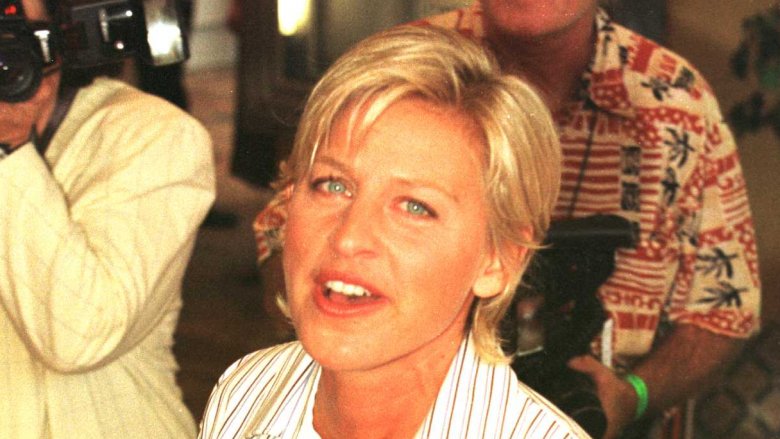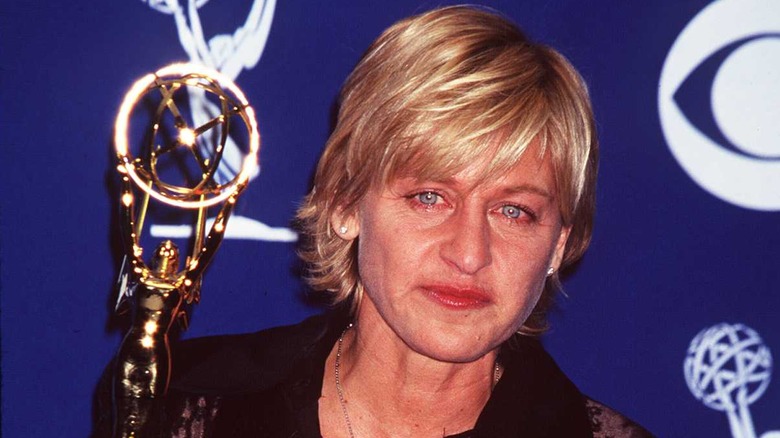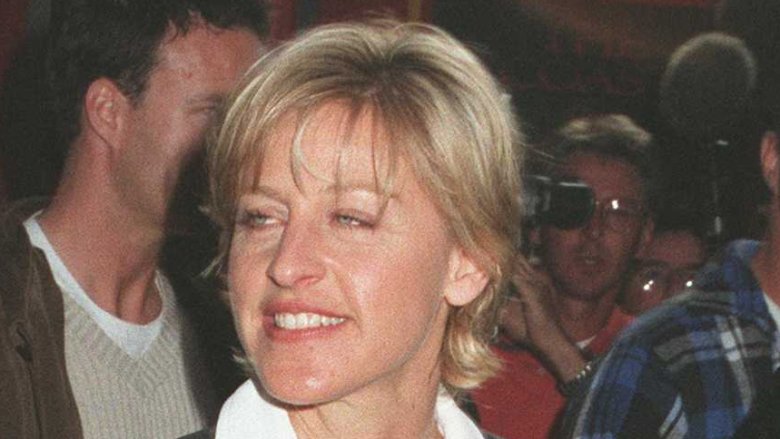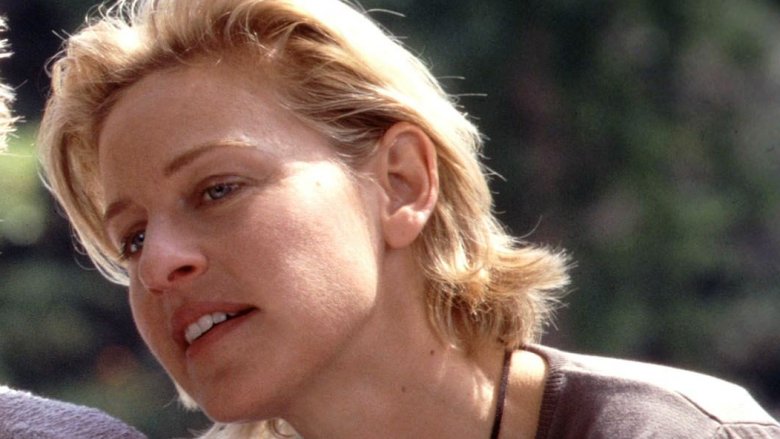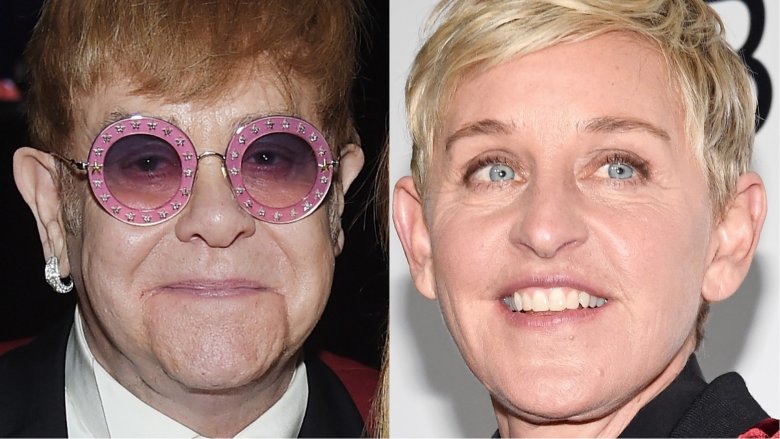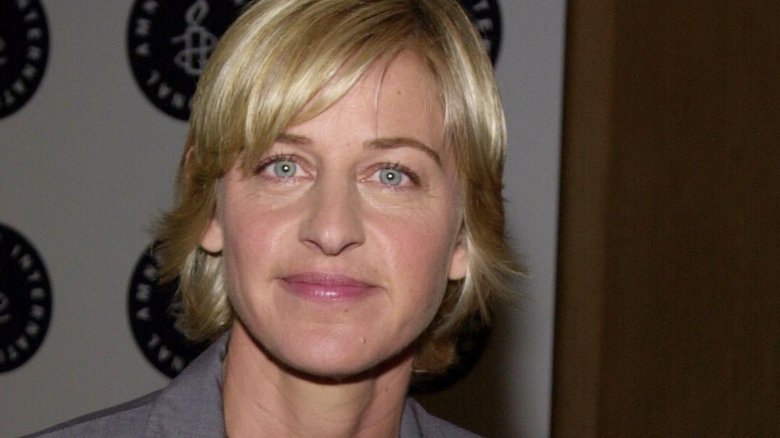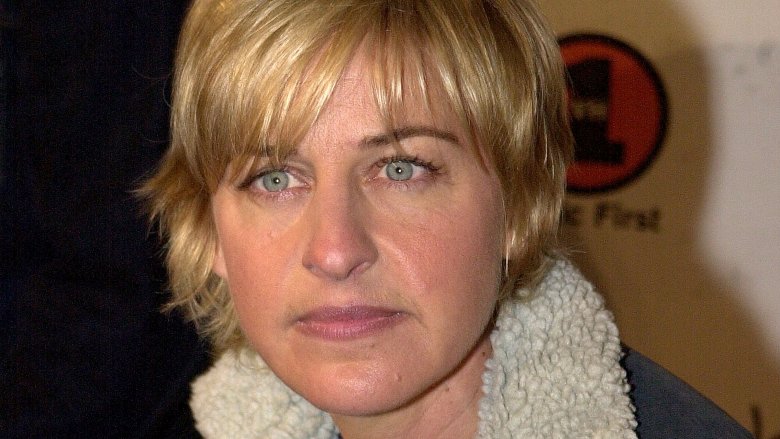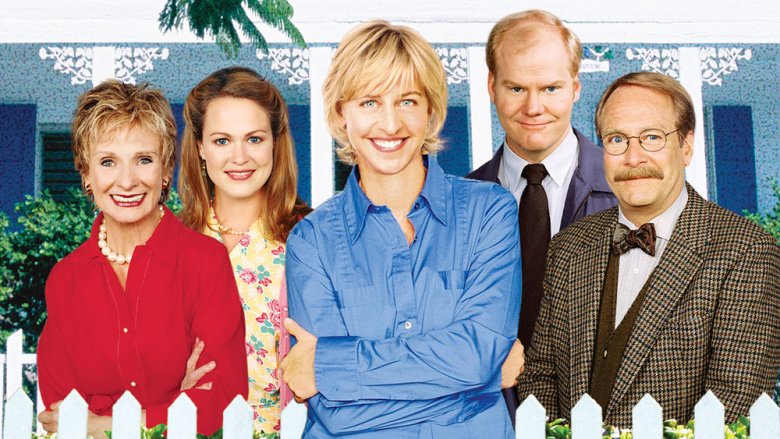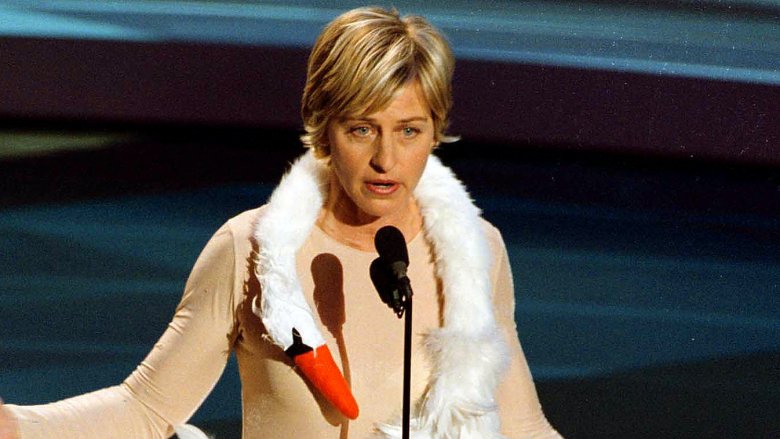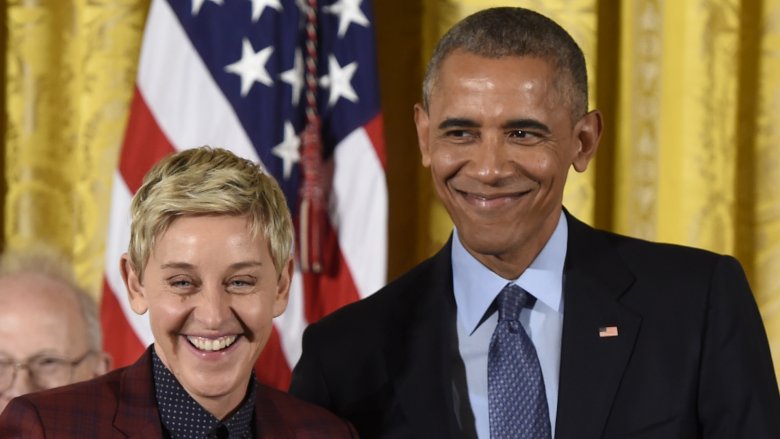When Hollywood Wouldn't Cast Ellen Anymore
She knew it wouldn't be easy. When Ellen DeGeneres proposed having her character, Ellen Morgan, come out on the ABC sitcom Ellen in 1997, she was expecting some resistance ... and she got it.
The show ended "because I came out," DeGeneres told The Armchair Expert in 2018. "[Execs] really didn't want me to come out ... I said 'It's my life ... I'm going to lose the career. Like, you can just put another show on.'"
As Ellen lumbered into its fourth season, ratings were slumping and producers were low on story ideas. DeGeneres, who came out in real life right around the same time as her character, told Time in 2001 that she made the move "selfishly for myself, and because I thought it was a great thing for the show, which desperately needed a point of view." Forty-two million people tuned in to the episode, which featured cameos by Oprah Winfrey as Ellen's therapist and Laura Dern as her love interest.
No one could have anticipated the backlash that followed: a bomb scare, hate mail, advertisers such as J.C. Penney and Chrysler unexpectedly dropping out. Jerry Falwell, perhaps inevitably, christened the comedian "Ellen DeGenerate," a pun she told Time she'd been hearing "since fourth grade. I guess I'm happy I could give him work."
Little did she know her career would be taking the kind of nosedive everyone fears. She essentially become an industry pariah. "I had no idea the amount of hate," DeGeneres told the Associated Press in 2017. "It was a really scary time."
Convincing ABC: a full-time job
Getting permission to have Ellen DeGeneres' character come out in the middle of the show was an uphill battle.
With or without a gay protagonist at its center, the future of Ellen already looked shaky. In 1997, Dava Savel, an executive producer on Ellen, told Newsweek that the key creative team "really needed to sit down with people [at ABC and Disney] and convince them there was a future for the show." Throughout July and August 1996, DeGeneres began meeting with Dean Valentine, Disney Television's president at the time, and Jamie Tarses, then the head of ABC Entertainment.
Execs were frustrated that her character, Ellen Morgan, never found a love interest during the show's first three seasons. According to Newsweek, Michael Eisner, then the chairman and chief executive officer of The Walt Disney Company, suggested getting the character a puppy to remedy the problem. ("Yeah, that's good," producers responded, like proverbial yes-men.) "It was an indication of just how lost the show was that they would be excited by Ellen buying a puppy," executive producer Mark Driscoll scoffed.
But eventually, bigwigs at ABC and Disney gave the go-ahead. On April 30th, 1997, Ellen Morgan came out on a two-part episode titled "The Puppy Episode," an inside joke among the show's creative team that underhandedly wagged a middle finger at higher-ups such as Eisner.
Not that other titles weren't bandied around. "Ellen Throws Her Career Away seemed too on the nose," DeGeneres joked 20 years later.
She found out the show was canceled from an article
The night "The Puppy Episode" aired, DeGeneres knew it was a success, but she could also sense that executives were apprehensive.
The celebratory vibe curdled fast after that first wave of excitement. "They stopped promoting [Ellen] because everyone was scared," DeGeneres told the Armchair Expert podcast. Producers became increasingly passive-aggressive. "They were just acting like 'We're just going to let it glide," Ellen explained.
The episode earned the highest ratings of any regularly scheduled ABC series that year. Nevertheless, the network stopped promoting the show, ratings declined, and advertisers continued to flee in droves. Execs, she said, "wanted me to go back in the closet."
Finally, the death knell: Ellen was canceled after five years and 109 episodes, with the Ryan Reynolds sitcom Two Guys, a Girl and a Pizza Place taking over its time slot. Two Ellen episodes were deemed too explicit for ABC and never aired, but the network did air an hour-long series finale. DeGeneres broke down recounting the show's demise in front of Diane Sawyer during a 1998 Primetime Live episode.
How DeGeneres learned the show was cancelled speaks volumes. She reportedly heard the news from one of her assistants, who'd just read about it in a trade magazine. "It destroyed me," DeGeneres told ABC's 20/20. "Trying to please everybody and wanting so desperately to be loved. That's why anybody gets into this business. You know and, to all of a sudden feel like you're not only not loved — you're hated."
The backlash was terrifying
The backlash made Ellen DeGeneres obsessively fear for her life. "I had a lot of death threats," she acknowledged on The Ellen DeGeneres Show in 2017. "And there was a bomb scare when we shot." In 2001, she told Making Gay History that she "really thought that I would be killed for what I did." She was convinced some maniac would physically attack her, particularly when homophobes shouted at her from their cars. Meanwhile, the endless barrage of jokes on late-night television ate away at her confidence. "I was the punchline of lots of jokes," she told Out in 2016. "I laughed at some, but I realized there's somebody on the other side of them. It's cruel."
DeGeneres also felt responsible for unwittingly damaging the careers of Oprah Winfrey and Laura Dern, both of whom suffered their fair share of abuse after the episode. Winfrey claims she received a beguiling amount of hate mail, with letters insisting the talk-show host "go back to Africa."
For about a year, Dern was "pinkballed," and nobody was willing to cast her in anything at all. "There was a period of time afterwards when it was like, 'What do we do with her?'" the Wild at Heart actress told the Telegraph in 2014.
Ellen couldn't believe the negative impact the show had had on the people around her: "I hurt straight people through this," she said (via The Ringer).
Elton John really hurt her feelings
In the wake of the show's cancellation, DeGeneres only did a Time cover story, a Primetime Live segment, and an Oprah episode, but since there was so much chatter about the show (including comedy routines, think pieces, and op-eds), it felt like people were "reporting on reports and reports and reports." DeGeneres said the public was soon burnt out on the subject and sick of the ensuing fracas. Plenty of celebs and members of the LGBTQ community took part in the subsequent backlash, too.
In 1997, Chaz Bono (known as Chastity Bono at the time), then the entertainment media director of the Gay and Lesbian Alliance Against Defamation (GLAAD), claimed Ellen had become "too gay" and the show's content was "excluding a large part of our society." (And this coming from someone who'd previously made a cameo on the show.) A gay lead was one thing, argued Bono, but it's another "when every episode deals with specific gay issues."
British pop star Elton John was even more vicious, reportedly sniping to New York (via the Guardian), "We know you're a lesbian. Shut up! Be funny!"
DeGeneres, who'd never met Sir Elton, was extremely upset by the soundbite and wondered to herself: "'What kind of support is that from a gay person?' But everybody assumed I was just nonstop talking about it. It hurt my feelings."
She became a Hollywood outcast
Coming out publicly ushered in an achingly dark period in DeGeneres' life.
"I was really, really in a deep depression," she told the Associated Press in 2017. "I had never been so down in my life." She felt attacked from all sides. "The bullying I endured [in Hollywood] after I came out made up for the lack of it during my childhood," she quipped to Good Housekeeping.
DeGeneres subsequently fled Los Angeles and moved to Ojai, Calif., figuring her career was effectively over. By that point, she was so out of favor she'd pick up the phone now and again "to make sure it was still working."
She started regularly visiting a therapist and went on antidepressants for the first time in her life. This helped her combat the ever-present anxiety that something terrible was going to happen to her. Her career, she felt, was at a terrible impasse. "It was scary and lonely," she told Good Housekeeping. "All I'd known for 30 years was work, and all of a sudden I had nothing. Plus, I was mad. It didn't feel fair — I was the same person everyone had always known."
Out of sight, out of money
For three years, DeGeneres couldn't find any acting gigs in Hollywood and claims she wasn't offered a single role. In 2017, she told the Today show's Matt Lauer (via Entertainment Tonight), "I was running out of money and didn't know if I was going to work again." There she was, 45 years old, sitting around her house and thinking, "This doesn't look good."
Since the cancellation of Ellen, "I was looked at as a failure in this business," she told the Armchair Expert podcast. "No one would touch me. I had no agent, I had no possibility of a job. I had nothing."
At the very least, she could reflect on the positive impact she'd had on some of her viewers. She received fan mail from gay people around the world, many of whom told her she'd changed their lives for the better. In fact, one of the first letters she received was from somebody claiming they'd contemplated suicide and decided not to go through with it "because of what I did."
Letters aside, the comedian didn't want to be considered a leader in the LGBTQ community. She felt like that was "a really difficult line to walk."
"Some people thought, 'You're not gay enough and you're not doing enough for our community and there are so many that have done more,'" Degeneres told the podcast. "I just wanted to be free from a secret. I just want to be a comedian and I just happen to be gay."
She returned to stand-up in 2000
"They say we only use 10 percent of our brain. Imagine what we could accomplish if we used the other 60 percent."
That's a line from The Beginning, DeGeneres' 2000 return to stand-up comedy. That year, she embarked on an ambitious 38-city tour in search of some career momentum. "I almost didn't get back up there," she told the New York Daily News shortly before the special aired on HBO. After suffering through several months of debilitating depression, DeGeneres finally had an epiphany: "I realized that the only thing I had control of in my life was my comedy." She also decided she needed to brush herself off and get back out there, if only to remind everyone she was more than "just a symbol of a lesbian that I'd become after I came out."
Since she was hoping to embark on an exciting new phase of her career, DeGeneres originally wanted to call the show The Born-Again Tour, but she worried the name would prove too controversial. "So, I called it The Beginning," she told the New York Daily News, "because stand-up is where I came from."
Her 2001 follow-up series only lasted 13 episodes
In 2001, The Ellen Show (originally titled Ellen Again) premiered on CBS, marking DeGeneres' return to the sitcom format. After that interminable period of feeling "in the middle of the desert with no hope in sight for water," the thought of starring in another situation comedy was definitely cheering to DeGeneres.
This time, the comedian played openly gay tech executive Ellen Richmond, backed by a supporting cast that included comedy legends Cloris Leachman and Martin Mull. Although the focus wasn't on her character's sexuality this time, the sitcom still stumbled in the ratings — likely because CBS slotted the show into its Friday night lineup, a move the New York Post said was usually a "disastrous" spot on the network.
The talent behind the project was considerable: The show was co-created by Seinfeld writer Carol Leifer and Mitchell Hurwitz, the man who'd go on to helm Arrested Development. Nevertheless, The Ellen Show was cancelled after only 13 episodes, with five completed episodes never airing. In a 2006 retrospective review of the season, Entertainment Weekly called the sitcom "not quite a classic, but it's a damn good show." At the very least, the all-too brief run demonstrated that networks were willing to bank on DeGeneres again.
For her part, the comedian took the show's demise in stride. "I did another sitcom," she wrote in her 2011 book, Seriously... I'm Kidding (via The Atlantic.) "Guess what happened? That got canceled, too. Not the point. ... The real point is that I kept going."
Finding Nemo (and a new career path)
On Nov. 4, 2001, DeGeneres hosted the 53rd annual Primetime Emmy Awards. The ceremony was pushed back twice in the wake of 9/11, which explains why she welcomed the sparse crowd to "the 53rd, 54th and 55th Emmy awards." DeGeneres' opening monologue included an uncharacteristically mordant zinger: "They can't take away our creativity, our striving for excellence, our joy ... only network executives can do that." Despite praising some of her jokes, Variety called the affair "a businesslike and somewhat sluggish three hours".
Nevertheless, by the time she made her 2001 cameo appearance in the Will & Grace episode called "My Uncle the Car," her career was starting to show signs of life again. Pixar's 2003 smash, Finding Nemo, introduced DeGeneres (or, at least, her voice) to a whole new generation of fans. The film holds a special place in her heart for a number of reasons.
When screenwriter/director Andrew Stanton called the comedian to ask if she'd lend her vocal talents to the project, she "hadn't worked for three years," she told The Telegraph in 2016. "I couldn't believe I would be offered anything, much less a part in a Pixar film." That same year, she told Entertainment Weekly: "That will always mean something to me, that he believed in me that much."
Finding Nemo took three years to complete. By the time the film hit theaters, DeGeneres' new talk show was already generating buzz, and she was hoping for the best.
Out of the woods: The Ellen DeGeneres Show and beyond
Talk about turning it around. An immediate hit right out of the gate, The Ellen DeGeneres Show has collected more than 50 Emmy Awards since its premiere episode on Sept. 8, 2003.
In 2016, DeGeneres was awarded the Presidential Medal of Freedom, with then-President Barack Obama choking up during his speech. During the ceremony, he described DeGeneres as an icon who "challenge[s] our own assumptions, remind[s] us that we have more in common than we realize, push[es] our country in the direction of justice."
Talking to Out that same year, DeGeneres took a moment to reflect on her remarkable career trajectory. "If this isn't an example of 'It gets better,' I don't know what is," she said. "Time is a strange thing. I was at rock bottom and out of money, with no work in sight, but one step at a time, it gets better. It gets much better than better."
Over the years, DeGeneres has learned how to persevere in the face of overwhelming odds. "[It] makes me realize that no matter how dark something gets ... there's always a possibility of good coming from it," she told the Associated Press in 2017.
And for anyone muddling through one of life's dark patches, she offers some advice: "Just hold on and know that something good will come from it, and there's always a lesson in everything."

